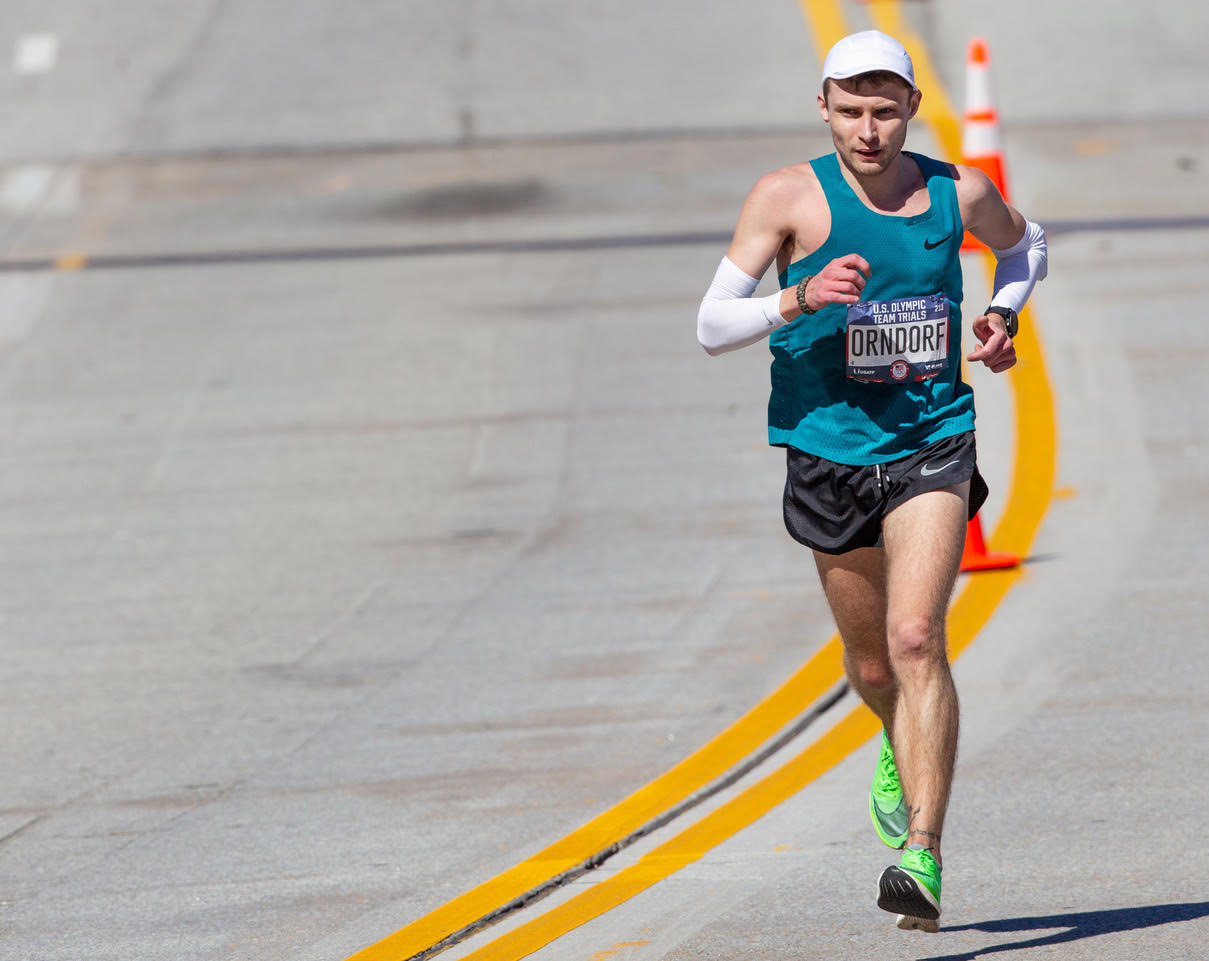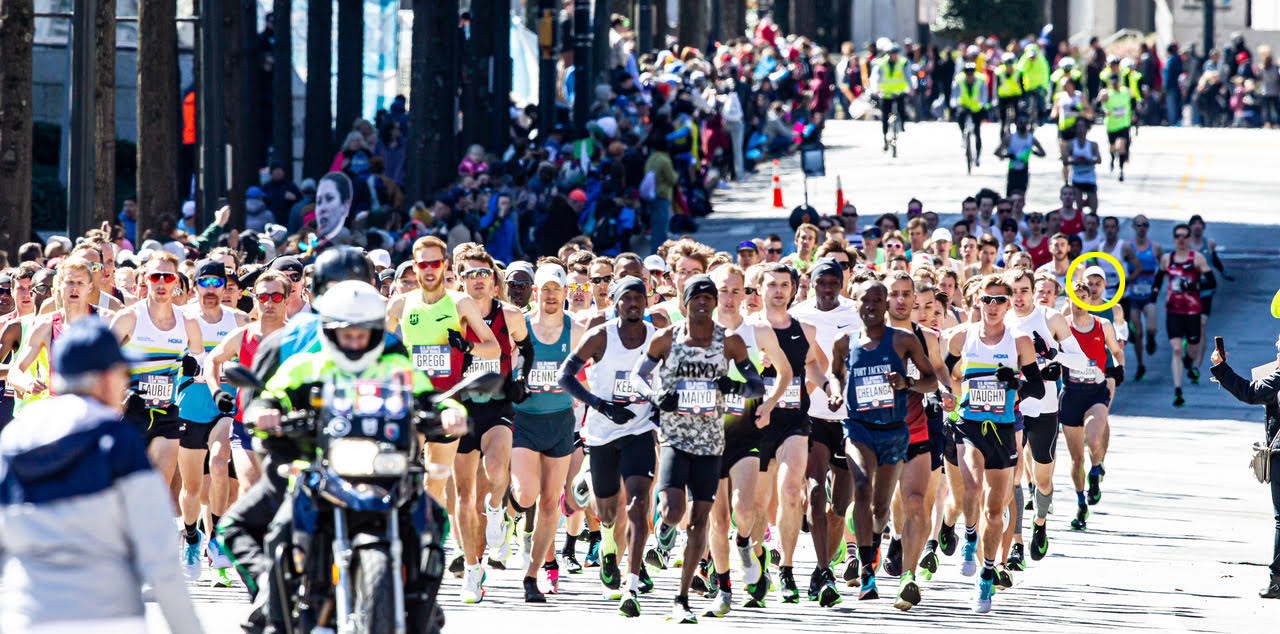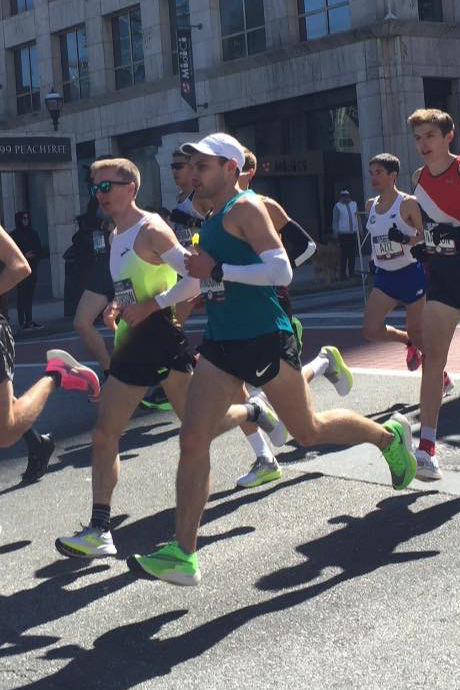Nate Orndorf, polymer science Ph.D. candidate, competes at U.S. Olympic Marathon Trials
From the lab to the road, Nate Orndorf finds motivation from hard work, failure, perseverance, and the process of competing.

Nate Orndorf running the last few miles of the U.S. Olympic Marathon Trials
Saturday, February 29, 2020 – As the day began in Atlanta, Ga., it wasn’t just any other day for the marathon running community or Nate Orndorf, a Ph.D. candidate in polymer science at The University of Akron. It was an opportunity to compete at the highest level and a chance to represent the United States at the 2020 Summer Olympics in Tokyo, Japan.
The U.S. Olympic marathon trials were held in Atlanta on a cold, windy day with less than ideal conditions. The course itself was extremely hilly which presented its own set of challenges, but for Orndorf, this was a chance of a lifetime and a goal he had trained for since high school.
He finished the race in 2:26:09, placing 114th in an elite field of 565 men and women athletes. We had the chance to congratulate Nate on his outstanding performance and interview him about his Olympic trials experience, his research studies here at the College of Polymer Science and Polymer Engineering, and his future goals for running and his research career.
Q: Tell us a little about yourself. Where are you from? Where did you attend high school? Where did you attend college for your undergraduate degree?
A: I was born in Sandusky, Ohio, and grew up in Bellefontaine, Ohio, where I attended Bellefontaine High School. After graduating, I attended Grand Valley State University in Michigan for my undergraduate degree and earned bachelor’s degrees in both physics and mathematics.
Q: When did you start your running career? How long have you been running?
A: I started running the summer after my eighth-grade year. I wanted to play in a city baseball league that summer, but my parents thought it would be a big investment with all the gear. Since all the other kids had been playing baseball their whole life, they also thought I'd have a hard time catching up. Instead, they convinced me to go out for the city track league, and I absolutely loved it. I then joined the cross-country team my freshman year of high school. It took me a year to figure out that you had to run year-round to be successful. That was in 2009, so I just hit a decade of consistently running.

The whole pack early on in the race; Nate's head can be seen on the right towards the middle-back of the pack (circled).
Q: When did you start running marathons? What motivated you to start running marathons?
A: When I first learned how the Olympic Marathon Trials worked while I was in high school, I was immediately set on participating someday. Of course, running a marathon in high school isn't the smartest thing to do, and I had aspirations to run competitively in college, so the marathon distance had to wait until after then. After I finished my college running career in 2017, my main focus was hitting the Olympic Marathon Trials standard of 2:19:00. It took me four races to finally hit the standard, with my first three marathons being 2:27, 2:35, and 2:39.
Q: Tell us about your experience at the Olympic trials. How was the race for you personally?
A: In the race itself, I was seeded 233rd out of 244 male competitors. Leading up to the race, I had spent a good amount of time looking at the qualifier statistics, and actually made a few histograms and plots, in order to figure out my personal goal. I knew that it was a hilly course and that the weather could be warm, so aiming to run a specific time at the Olympic Trials wouldn't be the best way to go about it. I thought I was in about 2:17:30 shape, and that qualifying time would rank someone near 100th, so getting top 100 was my main goal. I also knew that if the conditions were rough, I would have a shot at placing much higher if people started dropping out of the race. I started the race pretty conservatively, and then started to move up after about 10 miles. At mile 20, I was placed around the top 70 runners, but then I faded. I ended up finishing 114th after a very painful last few miles. It was a bit off my goal, but I still placed much better than my seed place, which is definitely something I can hang my hat on.
Q: What are your future plans for running?
A: I'm taking a short break now, but I'll find a shorter race to run this summer. I'm currently thinking about the Cleveland 10k, but I'm giving it some time before I make any concrete plans. One thing I'm sure of is that I'll be running the Akron Marathon in September. I won the Akron Half Marathon last year, but haven't run the marathon there yet. The Akron running community is amazing, and it really shows with how great of an event the Akron Marathon is every year. Getting back to the Olympic Trials in 2024 and bettering my place is definitely my next long-term goal.

Nate Orndorf at the U.S. Olympic Marathon Trials.
Q: What lessons have you learned from running that help you as a researcher and Ph.D. candidate?
A: It took a lot of mental and emotional stamina to come back after each of my first three marathons being slower than the one before, but I'm glad I kept at it. That's one area where I think running and academia really line up. You must be able to withstand failure after failure without it destroying you. It really makes you look at yourself and figure out what motivates you to do what you do. To me, competing is just one small part of running, which is why I could take failures and keep going back for more. In academia, you really have to enjoy the process of science and not be driven solely by getting papers accepted, winning grants, or having flashy results.
There’re often times when I'm absolutely knackered from training and completely stressed out from school and work that make me want to stop running competitively, but I remind myself that doing both is what got me to where I am today. In high school, I was earning mostly C’s when I told my cross-country coach that I wanted to run in college. He really got on me that I'd have to do better academically if I wanted to compete in college, and I really wanted to, so I started working harder in the classroom. If it wasn't for running, I probably wouldn't have ended up going to college. I'm now working towards a Ph.D., and I remind myself of that every time I think that life would be easier if I stopped running competitively.
Q: What brought you to The University of Akron? And why did you choose the College of Polymer Science and Polymer Engineering?
A: I first learned about the College of Polymer Science and Polymer Engineering when I came as a Research Experience for Undergraduates (REU) student in 2016. I really liked the area, especially the Cuyahoga Valley National Park and all the Metroparks. I wanted to continue research related to physics and wanted a degree that is valued in both academia and industry, and I thought that polymer science was great for that. Once I started to figure out how well-known The University of Akron is for polymers, it seemed like a great opportunity.
Q: What is your current research? What research group are you a part of?
A: I'm now a member of Dr. Dhinojwala's group. As a group, we study both the fundamental science of surfaces/interfaces and how we can use nature to inspire new materials. My personal research applies these methods to ice, where the goal is to understand the physical mechanisms behind ice adhesion and friction. There are two main applications of this research. The first is creating surfaces to which ice doesn't stick to or is easily removed from, such as for aircraft, which is a project I'm working on with researchers at the NASA Glenn Research Center. On the other hand, there are cases where we want high friction and grip on ice. This has led me to study polar bear paws to better understand how structures on a surface might help increase grip on ice for applications such as winter tires or shoe soles.
Q: What are your plans after graduating?
A: I've thought a lot about what I want to do after graduation, and I've come to the conclusion that I want to do research that leaves me fulfilled in a place that leaves me fulfilled. On the research side, I want to contribute towards making the world a better place by helping to solve environmental related problems. My fiancé and I both love the outdoors, and we hope to end up living in the mountains someday. While I'm leaning towards staying in academia, I'm confident that I can find a job that checks both boxes in either academia or industry.
